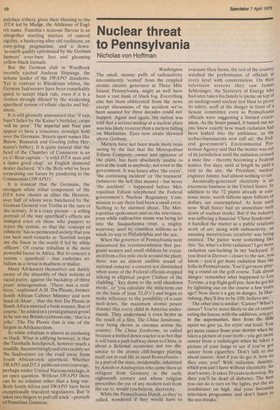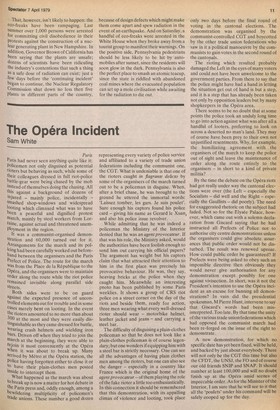Nuclear threat to Pennsylvania
Nicholas von Hoffman
Washington The small, steamy puffs of radioactivity intermittently 'vented' from the crippled atomic electric generator at Three Mile Island, Pennsylvania, might as well have been a vast bank of black fog. Everything else has been obliterated from the news except discussions of the accident we've been assured for three decades could not happen. Again and again, the nation was told that a serious mishap at a nuclear plant was less likely to occur than a meteor falling on Manhattan. Eyes now strain skyward above Gotham.
Matters have not been made more reassuring by the fact that the Metropolitan Edison Company, owner and operator of the plant, has been absolutely unable to reveal the truth to anybody; not even to the government. It was hours after 'the event', 'the continuing incident' or 'the transient' (whatever the hell that means) — but never 'the accident' — happened before Metropolitan Edison telephoned the Federal government's Nuclear Regulatory Commission to say there had been a small error. Nothing to be alarmed about, The Metropolitan spokesman said on the television, even while radioactive steam was being let into the Susquehanna river, a mighty waterway used by countless millions as it winds its way to Philadelphia and the sea.
When the governor of Pennsylvania next announced his recommendation that pregnant women and small children be evacuated from a five mile circle around the plant, there was an almost audible sound of national concern: a concern not diminished when some of the Federal officials stopped talking in elliptical jargon ('failure of the cladding,' key down to the cold shutdown mode', or 'you calculate the milierems out on the basis of your TLD's) and began to make reference to the possibility of a core melt-down, the maximum atomic power disaster that every child in America understands. They understand it even better as the result of a film, The China Syndrome, now being shown in cinemas across the country. The China Syndrome, so called because a melted down reactor is so hot that it will burn a path halfway down to China, is about a fictional occurence not too dissimilar to the atomic cliff-hanger playing itself out in real life in rural Pennsylvania — in a part of the state, incidentally, inhabited by Amish or Anabaptists who came there as refugees from Germany in the early eighteenth century and whose religion proscribes the use of any modern tool from the car to, would you believe, electricity.
While the Pennsylvania Dutch, as they're called, wondered if they would have to evacuate their farms, the rest of the country watched the performance of officials at every level with consternation. On their television screens they saw James Schlesinger, the Secretary of Energy who had once taken his family to picnic on top of an underground nuclear test blast to prove its safety, scoff at the danger in front of .a Senate committee even as Pennsylvania officials were suggesting a limited evacuation. As the hours passed, it turned out nOone knew exactly how much radiation had been leaked into the ambiance, as the techno-bureaucrats now call air; the Federal government's Environmental Protection Agency said that the matter was out of its jurisdiction until the radiation crossed a state line — thereby becoming a Federal matter. For days, until at length he paid a visit to the site, the President, nuclear engineer Jimmy, had almost nothing to say.
Atomically-generated electricity is an enormous business in the United States. In addition to the 72 plants already in existence more, worth billions upon billions of dollars, are contemplated. At least until now: Wall Street had an immediate melt down of nuclear stocks. But if the industry was suffering a financial 'China Syndrome's it handled the matter as a public relations work of art: along with radioactivity, an amazing meretricious creativity was being emitted. The patter went something like this: 'So, what's a little radiation? I get more radiation sun-bathing in my backyard. If you lived in Denver — closer to the sun, you know — you'd get more radiation than the folks in Pennsylvania. You'd get more playing a round on the golf course. Talk about danger: remember what happened to Lee Trevino, a top flight golf pro, how he got hit by lightning out on the course a few years ago? Now there's a guy in danger. In Harrisburg, they'll live to be 100, believe me.' The other line is similar: 'Cancer? What's cancer? You're more likely to die of cancer eating the bacon, with the additives, you get in the supermarket, then from the little squirt we give ya, for cryin' out loud. You get more cancer from your dentist when he takes a picture of your teeth — you get more cancer from a radiologist when he takes a picture of your lungs to see if you've got cancer from cigarettes. Don't talk to me about cancer. And if you do get it, how do they cure you? With radiation, dummy, which you can't have without electricity. So don't worry. It takes 20 years to develop. BY then you'll be dead of diabetes. The best you can do is turn on the lights, put the air conditioner on high, dial your favourite television programme and don't listen to the eco-freaks.' That, however, isn't likely to happen: the eco-freaks have been rampaging. Last summer over 1,000 persons were arrested for committing civil disobedience in their Protests against the construction of a nuclear generating plant in New Hampshire. In addition, Governor Brown of California has been saying that the plants are unsafe; dozens of scientists have been ridiculing the industry's contentions that such a thing as a safe dose of radiation can exist; just a . few days before the 'continuing incident' began to continue, the Nuclear Regulatory Commission shut down no less then five Plants in different parts of the country, because of design defects which might make them come apart and spew radiation in the event of an earthquake. And on Saturday, a handful of eco-freaks were arrested in the White House when they broke away from a tourist group to manifest their warnings. On the positive side, Pennsylvania pedestrians should be less likely to be hit by automobiles after sunset, since the residents will soon glow in the dark. Pennsylvania is also the perfect place to smash an atomic teacup, since the state is riddled with abandoned coal mines where the evacuated population can set up a mole civilisation while awaiting for the radiation to die out.



































 Previous page
Previous page